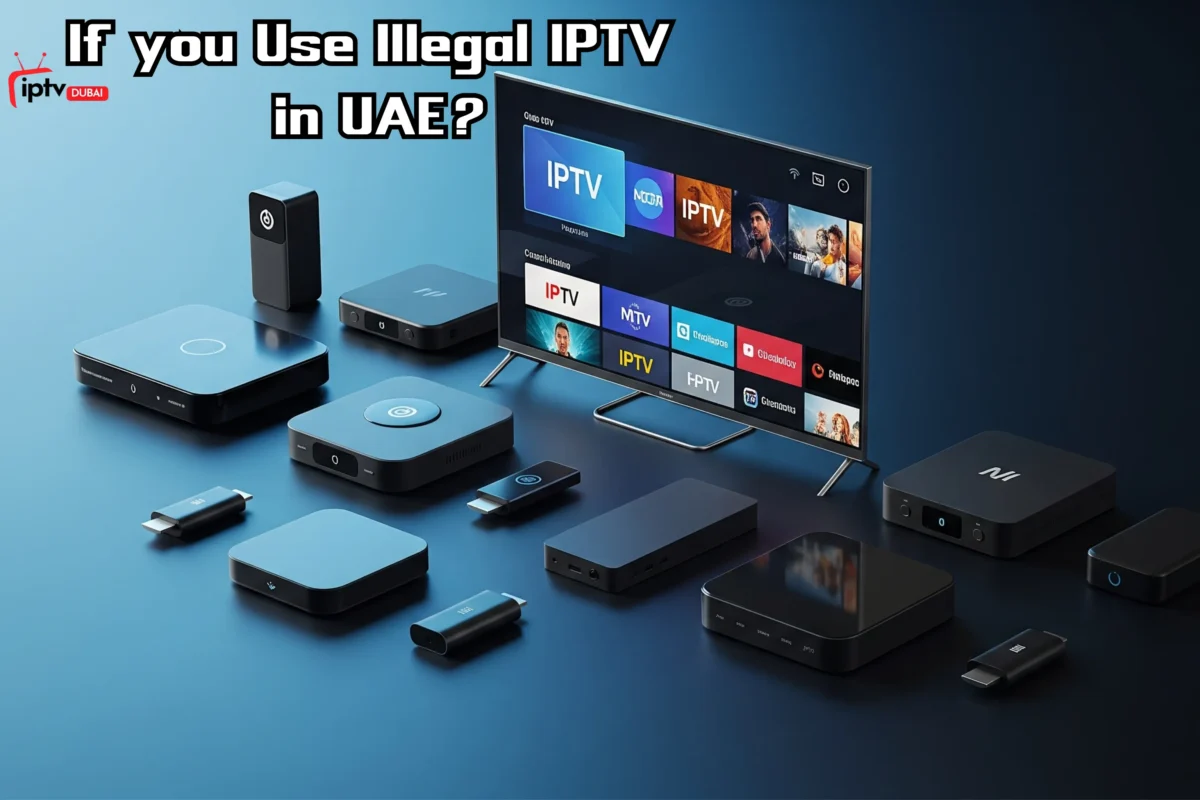Blog
IPTV Boxes to Avoid in UAE – Red Flags

Introduction
The Internet Protocol Television (IPTV) market in the UAE has experienced tremendous growth, with countless users seeking affordable alternatives to traditional cable and satellite services. However, this surge in popularity has also attracted numerous illegitimate providers offering questionable IPTV services that can put users at serious risk.
With the convenience of streaming content directly to your Smart TV, Android devices, or dedicated set-top box, it’s crucial to distinguish between legal IPTV providers and potentially dangerous services. This comprehensive guide will help you identify the red flags associated with illegal IPTV boxes and services in the UAE, ensuring you make informed decisions while protecting yourself from legal, financial, and security threats.
The UAE’s digital entertainment landscape has evolved rapidly, with streaming platforms becoming increasingly popular among residents and expatriates. However, this growth has created opportunities for fraudulent operators to exploit unsuspecting consumers through illegal IPTV services that promise premium content at unrealistic prices.
Understanding the Legal Landscape of IPTV in the UAE
The UAE maintains strict regulations regarding broadcasting and content distribution. Legal IPTV services must obtain proper licenses from the Telecommunications and Digital Government Regulatory Authority (TDRA) and comply with local content guidelines. These legitimate providers work directly with content creators and broadcasters to ensure proper licensing agreements are in place.
Understanding these regulations is essential because using unauthorised IPTV services can result in significant legal consequences, including hefty fines and potential criminal charges. The UAE government actively monitors and blocks illegal streaming platforms to protect intellectual property rights and maintain compliance with international broadcasting standards.
The regulatory framework in the UAE is designed to protect both content creators and consumers. Licensed IPTV providers must demonstrate financial stability, technical capability, and commitment to content quality standards. This rigorous licensing process ensures that legitimate services can provide reliable, high-quality streaming experiences while respecting intellectual property rights.
Potential Risks of Using Illegal IPTV Services
Beyond legal implications, illegal IPTV services expose users to numerous risks, including malware infections, identity theft, poor streaming quality, and complete loss of access without warning. These unauthorised platforms often lack proper customer support, leaving users stranded when technical issues arise.
The financial risks extend beyond subscription fees, as users may face legal penalties, device replacement costs due to malware damage, and potential identity theft recovery expenses. Additionally, illegal services often provide inconsistent streaming quality, frequent buffering, and unreliable access to advertised content.
Recognising Shady Websites
Identifying fraudulent IPTV websites is crucial for protecting yourself from scams and illegal services. Shady websites often employ sophisticated tactics to appear legitimate while hiding their true nature. These platforms frequently target users seeking affordable entertainment solutions, exploiting their desire for premium content at reduced prices.
The proliferation of fake IPTV websites has become a significant concern in the UAE, with new fraudulent platforms appearing regularly to replace those shut down by authorities. These websites often use similar domain names to legitimate services, creating confusion among potential customers.
Professional scammers invest considerable effort in creating convincing websites that mimic legitimate IPTV providers. They may use stolen logos, copied content, and fake testimonials to build credibility. However, careful examination reveals telltale signs of their illegitimate nature.
The sophistication of fraudulent websites continues to evolve, with some operators creating elaborate facades including fake customer support systems, professional-looking interfaces, and detailed service descriptions. Despite these efforts, consistent patterns emerge that help identify illegitimate operations.
Indicators of Illegitimate IPTV Providers
Identifying suspicious IPTV websites requires careful attention to several warning signs. Illegitimate providers often display poor website design, numerous spelling errors, and a lack of professional presentation. These platforms typically avoid providing clear contact information, business registration details, or physical addresses.
Red flag indicators include:
- Websites hosted on free domains or suspicious URLs
- Absence of terms of service or privacy policies
- Claims of “lifetime access” or unrealistic guarantees
- Payment methods are limited to cryptocurrency or untraceable transactions
- Aggressive pop-up advertisements and suspicious download links
- No clear information about company ownership or licensing
- Excessive use of urgency tactics (“limited time offer,” “act now”)
- Testimonials that appear fake or overly promotional
- Lack of social media presence or verified business profiles
- Promises of access to recently released movies and premium sports events
How to Verify a Website’s Authenticity
Legitimate IPTV providers maintain professional websites with clear business information, proper SSL certificates, and transparent pricing structures. Always check for official business registration numbers, physical office locations, and verified customer reviews from reputable sources.
Use online tools to verify domain registration dates, as established legal providers typically have longer domain histories. Additionally, legitimate services will have official social media presence and positive reviews across multiple platforms, not just testimonials on their website.
Verification steps should include checking the website’s SSL certificate, confirming business registration with local authorities, and researching the company’s history and reputation. Legitimate providers welcome scrutiny and provide multiple ways for customers to verify their authenticity.
Illegal Plugins and Extensions
The world of illegal IPTV plugins and extensions represents one of the most dangerous aspects of unauthorised streaming. These software components are designed to bypass legitimate content distribution channels, often exposing users to significant security risks while providing access to pirated content.
Illegal plugins have become increasingly sophisticated, with developers creating user-friendly interfaces that mask the underlying security threats. These applications often integrate seamlessly with popular media centre software, making them appear legitimate to unsuspecting users.
The distribution networks for illegal plugins operate through underground channels, including forums, social media groups, and word-of-mouth recommendations. These networks often provide installation guides and troubleshooting support, creating an illusion of legitimacy and reliability.
Many users unknowingly install illegal plugins while seeking free alternatives to paid streaming services. The appeal of accessing premium content without subscription fees drives adoption, despite the significant risks involved.
The lifecycle of illegal plugins is typically short, with developers frequently abandoning projects when faced with legal pressure or technical challenges. This instability leaves users without support and often results in device security compromises.
Common Illegal IPTV Plugins to Beware Of
Many illegal IPTV services distribute content through unauthorised plugins and extensions that can be installed on various devices, including Android boxes and Smart TV platforms. These plugins often promise access to premium channels without proper licensing agreements.
Common illegal plugins include modified versions of legitimate streaming applications, third-party add-ons for mediacentress, and unofficial apps distributed outside official app stores. These plugins frequently change names and locations to avoid detection by authorities and platform administrators.
Popular illegal plugin categories include sports streaming add-ons, movie and TV show repositories, and live television extensions. These plugins often target specific content niches, appealing to users seeking particular types of entertainment.
Risks Associated with Installing Unverified Plugins
Installing unverified plugins exposes your devices to significant security risks. These unauthorised applications often contain malware designed to steal personal information, monitor browsing habits, or use your device for illegal activities. Without proper antivirus protection, users may unknowingly compromise their entire network security.
Furthermore, these plugins can cause device instability, void warranties, and create vulnerabilities that cybercriminals can exploit. The lack of official support means users have no recourse when problems arise, often requiring complete device resets or professional technical assistance.
The malware embedded in illegal plugins can range from simple adware to sophisticated trojans capable of stealing banking information and personal credentials. Some plugins create backdoors that allow remote access to infected devices, potentially compromising entire home networks.
Suspiciously Low Price Offers
The economics of legitimate IPTV services make extremely low prices a clear indicator of illegal operations. Understanding the true costs involved in providing legal IPTV services helps consumers recognise unrealistic pricing schemes designed to attract unsuspecting customers.
Fraudulent IPTV providers often use predatory pricing strategies to quickly acquire large customer bases before disappearing with collected payments. These schemes typically involve initial low prices followed by unexpected charges or complete service termination.
The psychology behind low-price offers exploits consumers’ desire for bargains, particularly in markets where legitimate services may seem expensive. Scammers understand that price-sensitive customers may overlook warning signs when presented with seemingly attractive deals.
Market analysis reveals that legitimate IPTV services require substantial ongoing investments in content licensing, infrastructure maintenance, and customer support. Services offering prices significantly below market rates cannot sustain these necessary expenses through legal means.
The true cost of illegal IPTV services extends far beyond subscription fees, encompassing potential legal penalties, security breach recovery, and device replacement costs. These hidden expenses often exceed the savings from choosing cheap illegal alternatives.
Why Low Prices Are a Red Flag
Legitimate IPTV services require substantial investments in licensing fees, infrastructure, and customer support systems. When providers offer extensive channel lineups at unrealistically low prices, it typically indicates they’re operating without proper licenses or cutting corners on essential services.
Legal IPTV providers must pay content creators, maintain high-quality streaming infrastructure, and comply with regulatory requirements – all of which contribute to operational costs. Suspiciously cheap services often compensate for low prices by compromising on streaming quality, reliability, or user security.
The content licensing industry operates on established pricing models that reflect the value and popularity of different channels and programming. Services that ignore these market realities are likely operating outside legal frameworks.
Real Costs of Using Cheap IPTV Services
While cheap IPTV services may seem attractive initially, users often face hidden costs, including poor streaming quality, frequent service interruptions, and potential legal consequences. These services typically lack reliable customer support, leaving users without assistance when technical issues arise.
Additionally, cheap services may expose users to identity theft, credit card fraud, and malware infections that can result in significant financial losses. The cost of recovering from these security breaches often far exceeds the savings from using discounted illegal services.
The opportunity cost of unreliable service includes missed entertainment experiences, frustration with technical issues, and time spent seeking alternatives. Many users find themselves subscribing to multiple cheap services in attempts to find reliable access, ultimately spending more than legitimate alternatives would cost.
Unauthorised Third-Party Subscription Services
The ecosystem of unauthorised third-party subscription services has grown increasingly complex, with multiple layers of resellers and intermediaries operating between illegal content sources and end users. These networks often span multiple countries, making enforcement challenging and user protection difficult.
Unauthorised subscription services frequently operate through social media platforms, messaging apps, and online marketplaces. They may present themselves as legitimate resellers or authorised distributors while providing access to pirated content streams.
The business model of unauthorised subscription services relies on volume sales and minimal customer service investment. These operations typically focus on customer acquisition rather than retention, as they expect high churn rates due to service quality issues and legal interventions.
Many unauthorised services target specific demographic groups or geographic regions, tailoring their offerings to local preferences and languages. This targeted approach helps them build customer bases while avoiding detection by authorities focused on larger operations.
The financial structure of unauthorised subscription services often involves complex payment processing chains designed to obscure money flows and avoid regulatory oversight. These arrangements frequently leave customers without recourse when services fail or disappear.
Dangers of Unregistered Providers
Unregistered IPTV providers operate outside legal frameworks, offering no consumer protections or service guarantees. These providers can disappear overnight, taking customer payments without providing promised services or support. Users have no legal recourse when dealing with unauthorised providers.
These services often use stolen content, putting both providers and users at risk of legal action from content owners. The lack of proper business registration means customers cannot verify the legitimacy of the service or seek compensation for poor service quality.
The operational instability of unregistered providers creates constant uncertainty for users, who may lose access to services without warning or explanation. This unpredictability makes it impossible to rely on these services for consistent entertainment access.
Consequences of Using Unauthorised Subscriptions
Using unauthorised IPTV subscriptions can result in immediate service termination, legal notices from internet service providers, and potential prosecution under UAE copyright laws. Many users discover their personal information has been compromised or sold to third parties without their consent.
Internet service providers in the UAE actively monitor for illegal streaming activities and may throttle or suspend accounts found accessing unauthorised content. This can affect all internet-dependent activities, not just IPTV streaming.
The legal consequences of using unauthorised subscriptions can include substantial fines, criminal charges, and permanent records that may affect employment and travel opportunities. The UAE’s strict enforcement of intellectual property laws makes these risks particularly significant.
Extensive Channel Lineups: Too Good to Be True?
The promise of extensive channel lineups represents one of the most common tactics used by illegal IPTV providers to attract customers. Understanding the realities of content licensing helps consumers recognise unrealistic channel offerings that indicate illegal operations.
Legitimate content distribution involves complex negotiations between broadcasters, content creators, and service providers. These agreements typically include geographic restrictions, pricing tiers, and quality standards that limit the channels available through any single service.
The global nature of content licensing means that legitimate providers must navigate different legal frameworks, cultural sensitivities, and business practices across multiple jurisdictions. This complexity makes it impossible for legal services to offer unlimited international content at low prices.
Market dynamics in the broadcasting industry create natural limitations on channel availability, as content owners seek to maximise revenue through exclusive distribution agreements and geographic market segmentation.
Consumer education about content licensing realities helps set appropriate expectations and reduces susceptibility to unrealistic promises from illegal providers.
The Reality Behind Claims of Numerous Channels
Legitimate IPTV providers must negotiate individual licensing agreements for each channel in their lineup. Services claiming to offer thousands of international channels at low prices are likely operating without proper licenses, making their offerings illegal and unreliable.
Real legal IPTV services typically offer curated channel selections based on their licensing agreements and target audience. Excessive channel claims often indicate that the service is redistributing pirated content without authorisation from broadcasters or content creators.
The economics of content licensing make it impossible for legitimate services to offer unlimited channel access at low prices. Each channel requires separate licensing fees, technical integration, and ongoing support costs that must be reflected in service pricing.
Ensuring Compliance with Broadcasting Rights
Legal IPTV services display their licensing information and content partnerships. They work directly with broadcasters and content distributors to ensure proper authorisation for all channels and programming. This transparency helps users verify the legitimacy of the service.
Legitimate providers also respect geographical restrictions and broadcasting rights, which may limit certain content based on user location. Services that ignore these restrictions are likely operating illegally and may face sudden shutdowns or legal action.
Compliance with broadcasting rights involves ongoing monitoring and adjustment of channel lineups based on licensing agreement changes, content owner requirements, and regulatory updates. This dynamic process requires significant administrative resources that illegal services typically avoid.
Data Security Threats
The data security landscape surrounding illegal IPTV services presents multifaceted threats that extend far beyond simple privacy concerns. These unauthorised platforms often serve as vectors for sophisticated cybercriminal operations targeting personal information, financial data, and device security.
Cybersecurity experts have identified illegal IPTV services as increasingly popular targets for malware distribution, with criminals exploiting users’ desire for free or cheap content to deploy various forms of malicious software. These threats range from simple adware to complex banking trojans and ransomware.
The architecture of illegal IPTV services often lacks basic security measures, making user data vulnerable to interception, theft, and misuse. Unlike legitimate services that invest heavily in cybersecurity infrastructure, illegal providers typically prioritise cost reduction over user protection.
Data breaches involving illegal IPTV services have exposed millions of user records, including personal information, payment details, and viewing habits. These breaches often go unreported due to the illegal nature of the services, leaving users unaware of their exposure.
The international nature of many illegal IPTV operations complicates data protection enforcement, as these services may operate across multiple jurisdictions with varying privacy laws and enforcement capabilities.
How Illegal IPTV Poses Cybersecurity Risks
Illegal IPTV services often lack proper security measures, making user data vulnerable to cybercriminals. These platforms may intentionally collect personal information for fraudulent purposes or inadvertently expose user data through poor security practices.
Many illegal IPTV applications require extensive device permissions, potentially allowing unauthorised access to personal files, contacts, and financial information. Without proper security protocols, user account credentials and payment information remain at constant risk of theft.
The technical infrastructure supporting illegal IPTV services frequently includes compromised servers, unsecured databases, and vulnerable communication protocols that create multiple attack vectors for cybercriminals seeking to exploit user data.
Protecting Personal Data and Privacy
Users should prioritise services that implement strong encryption, secure payment processing, and transparent privacy policies. Legitimate IPTV providers invest in cybersecurity measures to protect customer information and maintain service reliability.
Always use reputable antivirus software and avoid providing unnecessary personal information to IPTV services. Regularly monitor financial accounts for unauthorised transactions and immediately report suspicious activities to the relevant authorities.
Comprehensive data protection strategies should include using virtual private networks (VPNs), enabling two-factor authentication where available, and regularly updating device security software to protect against emerging threats.
Legal Alternatives to Avoid Red Flags
The landscape of legal IPTV alternatives in the UAE offers numerous options for consumers seeking legitimate entertainment solutions. Understanding these alternatives helps users make informed decisions while supporting the legitimate content industry and avoiding the risks associated with illegal services.
Legal IPTV providers in the UAE operate under strict regulatory oversight, ensuring compliance with local laws and international content licensing agreements. These services provide reliable access to quality content while protecting users from legal and security risks.
The competitive market for legal IPTV services has driven innovation in content delivery, user experience, and pricing models. Many legitimate providers now offer flexible subscription options, high-definition streaming, and comprehensive customer support that rivals traditional broadcasting services.
Government initiatives in the UAE support the development of legal digital entertainment platforms, creating incentives for legitimate providers to offer competitive services while maintaining regulatory compliance.
Consumer awareness campaigns and educational resources help UAE residents understand the benefits of choosing legal IPTV services over illegal alternatives, contributing to market growth and improved service quality.
Choosing Verified & Legal IPTV Providers
Legal IPTV providers in the UAE display proper licensing information, maintain transparent business practices, and offer reliable customer support. These services work within regulatory frameworks to provide legitimate access to licensed content.
Verified providers typically offer free trials, clear pricing structures, and multiple payment options through secure, traceable methods. They maintain professional customer service teams and provide technical support through official channels.
The verification process for legal IPTV providers should include checking business registration with UAE authorities, confirming content licensing agreements, and reviewing customer feedback from independent sources.
Tips for Finding Reliable IPTV Services
Research potential IPTV providers thoroughly by checking official business registrations, reading verified customer reviews, and confirming licensing agreements. Contact customer support before subscribing to evaluate their responsiveness and professionalism.
Choose providers that offer reasonable pricing for their channel lineups, maintain active customer support, and provide clear terms of service. Avoid services that require unusual payment methods, offer unrealistic guarantees, or lack transparent business information.
Reliable IPTV service selection should involve comparing multiple providers, testing service quality during trial periods, and evaluating long-term value propositions beyond initial pricing considerations.
Conclusion
Navigating the IPTV landscape in the UAE requires careful consideration of legal, security, and quality factors. By recognising the red flags associated with illegal IPTV services – including suspicious websites, unauthorised plugins, unrealistic pricing, and excessive channel claims – users can protect themselves from legal consequences and security threats.
The risks associated with illegal IPTV services far outweigh any perceived benefits. From malware infections and data theft to legal prosecution and poor streaming quality, these unauthorised services create numerous problems for users seeking entertainment solutions.
Investing in legitimate IPTV services ensures reliable access to quality content while supporting content creators and maintaining compliance with UAE regulations. By choosing verified providers with proper licenses, transparent business practices, and robust security measures, users can enjoy IPTV services without compromising their safety or legal standing.
The evolving digital entertainment landscape in the UAE offers increasing opportunities for legitimate IPTV services to provide competitive alternatives to illegal options. As technology advances and regulatory frameworks mature, legal providers continue to improve their offerings while maintaining the security and reliability that illegal services cannot match.
Remember that the cheapest option is rarely the best value when it comes to IPTV services. Prioritise legal compliance, data security, and service reliability when selecting an IPTV provider to ensure a positive and safe streaming experience for you and your family. The investment in legitimate services pays dividends through consistent access, professional support, and peace of mind that comes with legal compliance.








